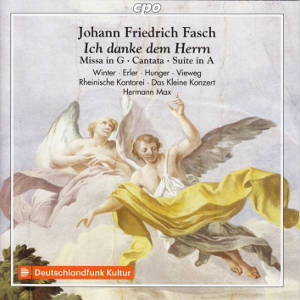There were more than a few Johanns coloring the musical landscape in early 18th century Germany. At almost the same time as a certain composer named Johann Sebastian took his post as cantor in the city of Leipzig, another, Johann Friedrich, assumed his position as Kapellmeister in the town of Zerbst. Both of these men, the former of course named Bach, the latter Fasch, were to remain in those positions, with varying impacts on the history of music, for the rest of their lives.
Despite their contemporaneous existence and relative proximity (Fasch also had a Leipzig connection, having studied music at both the Thomasschule and Leipzig University) stylistic similarities in their music are hit and miss, exhibited, whether by design or not, by the three works included here–two sacred choral pieces and one instrumental suite. Although apparently written earlier than the Bach-like cantata (1736), the Mass (1720s) is harder to pin down: its 20 sections feature varied styles and performing configurations, from a beautiful choral fugue (“Qui propter…”) to a Crucifixus whose hard-chugging rhythm in the strings and clashing choral harmonies suggest a certain Italian theatricality, while the opening Kyrie sounds as if it could be from a (much) later period. The Suite likewise is a mixture of styles and flavors that remind you of Handel, Bach, and Telemann (the latter of which Fasch confessed was his inspiration in the “overtures”).
If it seems as if what I’m saying is that there’s not a lot of originality on display in these works, that is true; but it takes nothing from the fact that these pieces are never less than well-conceived and effectively, engagingly written, and deserve the attention they receive here. It’s worth noting that, especially in his later instrumental music, which is where you’re most likely to encounter him today (you can read reviews of many of these in our reviews archive), Fasch is credited with pushing toward classical-period techniques that were ahead of some of his important contemporaries.
It always helps, when showcasing the work of lesser-known composers–especially when the work is of high quality–to have first-rate performers who understand the music and know how to render it in the most favorable light. Hermann Max and his choir and orchestra deliver just that, with ensemble precision and a certain passion and expressive manner from all concerned (including the fine soloists) that keep us happily listening. The liner notes are a bit confusing in several instances, but that’s the only flaw in this excellent addition to CPO’s Fasch catalog. The sound is first rate as well.
































